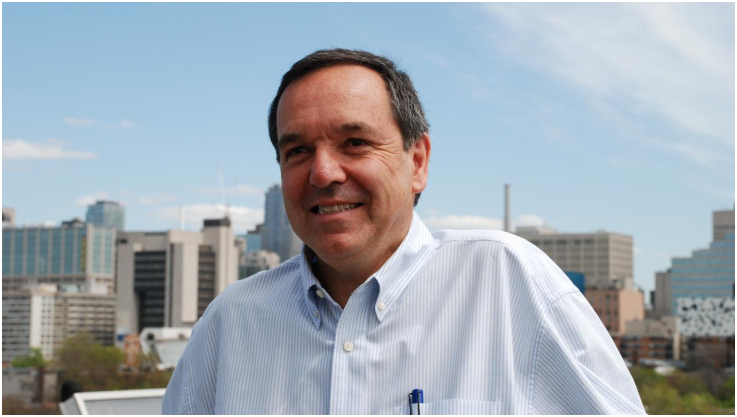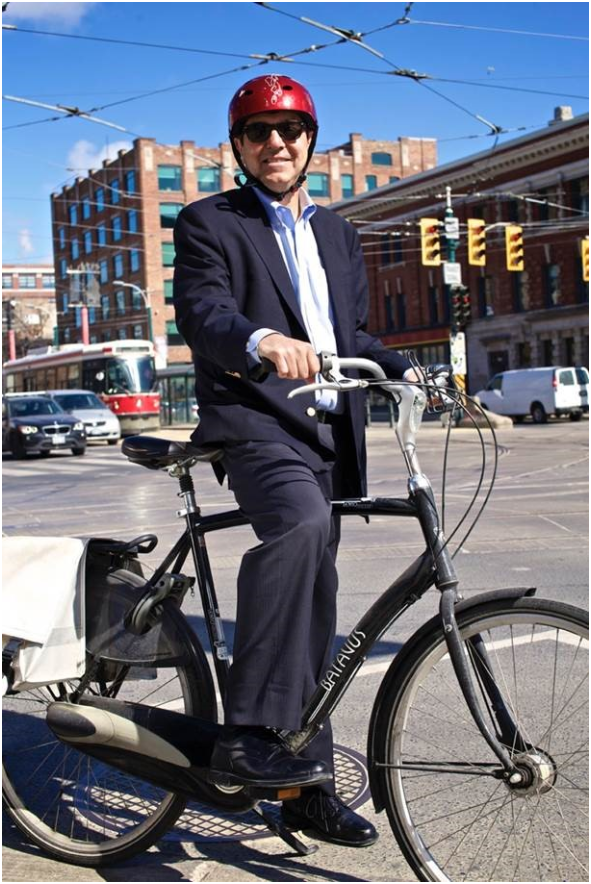In October, Toronto residents will go to the polls for the first municipal election since 2018. A lot has changed. The COVID-19 pandemic has dramatically altered the way Torontonians socialize, work, and commute and raised financial challenges. Several high-profile city councillors have decided not to run for re-election, including Joe Cressy, Ana Bailāo, and Deputy Mayor Denzil Minnan-Wong. Kristyn Wong-Tam resigned earlier this year to run in the provincial election. Premier Doug Ford has said that the next mayor of Toronto will have so-called strong powers, including a more robust mayoral veto, to deal with the city’s challenges over the next four years.
The one constant has been John Tory, mayor since 2014 — a clear favourite to hold onto the job. His most prominent challenger is Gil Penalosa, an urbanist and the founder of the non-profit 8 80 Cities.

TVO.org speaks with Penalosa about his vision for the city, what Tory gets wrong about Toronto, and why he thinks the strong powers are the wrong choice for this moment.
TVO.org: In the 1990s, you were the commissioner for parks, sport, and recreation in your hometown of Bogota. Your brother was the mayor of Bogota. What brought the two of you into politics?
Gil Penalosa: Well, I was not the commissioner when my brother was the mayor. It’s a long story in some ways. Our father had worked a little bit in the public sector, and then he was with the United Nations. He would tell us about his experiences, about issues of poverty, about the lack of equality.
Maybe we were bitten by the issue of cities. Our mother was a landscape gardener, so maybe the love for greenery and plants came from that. My brother was involved in politics pretty much all his life. I was not: I was in the private sector. One time he was running for mayor, he wasn’t doing well, and I decided to help him out. He lost, but I got to meet his opponent and something very, very strange happened: he invited me to be his parks commissioner, to work directly with him. So that’s how.
I had managerial experience. I led the construction of over 200 parks. I took a small program of open streets — a few kilometres — and turned it into the world’s largest pop-up park every Sunday of the year: 121 kilometres are open to people to walk and bike and run.
I came to Canada 23 years ago. I came for two years. My wife and I wanted our children to learn English, but we fell in love with the country. We fell in love with the city, and we decided to stay for good. I lived in Mississauga for about three years in a low-paying job, like most immigrants. And then, 17 years ago, I created 8 80 Cities, which is our non-profit based in Toronto. And then, about seven or eight years ago, I left as executive director of 8 80, created a board, and I’m the chair of the board. So now I’m doing more of my own work. In the past 15 to 20 years, I have worked in more than 350 different cities in all continents. I’ve been lucky because I’ve been able to learn what works, what doesn’t work. Every city and every neighbourhood is different.

TVO.org: I want to talk about 8 80 Cities in a second, but back to Bogota first — what is one thing from that period of your career that you’ve taken with you?
Penalosa: Two things: one is the importance of equity. Equity, equity, equity. I think that it’s in my heart, in my soul, that our priority has to be the most vulnerable citizens. The most vulnerable by age are the small children and the elderly, but also everyone that is poor, everyone with disabilities, racial minorities, ethnic minorities — those have to be a priority.
The second thing is how important the parks are. People say, “Oh, nice. Parks are fun and games." Of course it’s fun and games, but it is much more. Parks and public space are equalizers — the sidewalks, the streets. We need better parks in the poor areas, which is not what we have. We have fewer parks and worse quality in the poor areas. Low-income people live in smaller places — they need better parks, better bike lanes. That is something that I learned: the lower the income, the better the public space that they need.
And finally, the issue of open streets. In Bogota, I took 121 kilometres (which by the way, has not increased one kilometre since I left). That is something I have spoken about in more than 350 cities. Why is this important? For two reasons. It’s not just about recreation, even though it’s magnificent recreation, but more than that it is a wonderful equalizer. I connected the poorest neighbourhoods of the city with the wealthier neighbourhoods in the city. It’s almost the only place in the city where the very wealthy meet as equals with the very poor, where the CEOs and owners of large corporations and their spouses and children meet their minimum-wage workers and spouses and children as equals. Because they don’t live in the same buildings. Their children don’t go to the same school, and they don’t eat at the same restaurants. But, here, they are equals.
TVO.org: many readers might not know about your work with 8 80. What’s an example of the organization’s work, or your work outside it, that you think is relevant to explaining your vision for Toronto?
Penalosa: 8 80 Cities is a simple but powerful concept: what if everything that we did in our city had to be great for an eight-year-old and an 80-year-old? Not eight to 80, but an eight-year-old and 80-year-old as an indicator. The sidewalks, the crosswalks, the parks, the buildings, the libraries: if everything had to be great for an eight-year-old and an 80-year-old, then it will be great for everybody. We need to stop building cities as if everybody is 30 years old and athletic. We need to build cities for everyone. I think that concept is very, very powerful.
For example, having safe streets. In Toronto, a person driving a car hits someone walking every 3.5 hours. Most of it is in areas where it is not safe for an eight-year-old or an 80-year-old, and then it is not safe for anybody. We have to have clearer priorities, and that could really be transformative.
TVO.org: Is there any belief that you once held about city building that the COVID-19 pandemic has upended?
Penalosa: I think the pandemic was an accelerator. I feel we have become less affordable, less equitable, less sustainable not because of the pandemic. But I really liked your question, because when people went to work at home, all of a sudden they realized that they live in neighbourhoods. Neighbourhoods became very, very important. take the local park: all of a sudden, we told people to go to the park to be physically active but stay distanced. Many people didn’t have a park within walking distance. So we clearly see a problem with equity. Some areas of the city have a magnificent park system; some areas don’t.
The other thing is, I’m totally aligned with the 15-minute nieghbourhood. That means having everything that we need on a daily basis within 15 minutes. The grocery store, the corner store, the library, public transit, the bar, all within a 15-minute walk. But the only way to be able to do that is to have some density.
For example, we need to have corner stores and coffee shops in neighbourhoods all over the city. Downtown Toronto, you have lots of them. As soon as you leave downtown, it’s illegal. How can you tell children to walk for an ice cream if there is not an ice-cream place within walking distance? So we need those corner stores and those coffee shops. They are community builders.
We like our neighbourhood, and we like nature. During the pandemic, everyone acknowledged that we all have mental-health issues at some point or another, and we realize that nature is good for mental health. So we need nature close by to help relieve the tension. On the sidewalks, on the streets, in the parks, everywhere.
I also think people have come to think about climate change. Today it is very hard, and it is going to get even worse. If we connect the effects of the pandemic and climate change, the status quo is taking us backwards. We cannot continue for another four years that are the same as the past eight. There is an emergency: climate change is around the corner, and it’s already happening. We have not made it a priority. We talk and talk but do not make it a priority.
TVO.org: You’re entering the race from outside of formal politics. What inspired you to join this race at this time?
Penalosa: I’ve always been close to politics. I’ve advised and work directly with the mayors and councils of hundreds of cities. So it was always in the back of my mind. I thought: if I don’t see anyone that is going to make the city more affordable and more equitable and more sustainable, I’m going to jump in. And that’s what happened.
I know that it won’t be easy. That’s why many people didn’t register, because they think that the incumbent is going to win. I know the incumbent is a nice person, a nice man. But being nice is not enough. Some people want to be mayor; very few want to do as mayor. Clearly, the current mayor wants to be mayor. I want to do as mayor. To me, being mayor is a means to other ends. To him, being mayor is the end itself.
TVO.org: As you said, it’s going to be difficult to beat the incumbent. He’s a pretty clear favourite. Do you have goals in this race apart from winning?
Penalosa: First, I want to win. But I also hope that I can take advantage of this bigger microphone to communicate a different way of living, different values around what makes us healthier and happier.
For example, to me, children four and under and their caregivers have to be an absolute priority. The first four years are the most critical. In those 48 months, we develop our brain, our muscles, our bones. So, for example, on mobility, I want to make children aged zero to four and their caregivers a top priority, an indicator. At an intersection, whatever time we have to cross: Is it safe for them? When we get on the subway, and we get to the escalator, and it’s broken, and no one is fixing it. Is that safe? If I’m able to communicate that that should be a top indicator, that is important to me.
Also, all over the city, we’re posting these ageist signs, ageist because it’s discriminating against older people. They say “senior safety zone begins” and then “senior safety zone ends.” That’s stupid. That doesn’t make any sense. That’s discriminating against seniors. What is a senior? People in their 60s or 70s? Those signs only remind people that older people are fragile and weak. If you have a disability, then you might need special conditions, but that’s whether you are 15 or 30 or 50 or 80 or 100 years old. These are two segments of the population that are very forgotten: zero-four and their caregivers, and people over 60. Past 60 is one-third of our lives. People over 60 are mostly healthier and happier, but they are not prioritized.
Parks and recreation does almost no programs for people aged zero-four and their caregivers or for people over 60. We should have lots of programs. It’s a physical issue and a mental-health issue. It’s not just about having a walking path, but about having the money to do walking groups. We need to have the hardware, but we also need to have the software. It is not only infrastructure; it’s also about programs. Sometimes it seems easier to find a million dollars for a park than a few thousand to make it work. Money for useful activities is as important as infrastructure.
So things like that. If I could get those things across such that councillors, for example, will say, “You know that thing that he was proposing is a good idea. We want to do it.” That would be a goal in itself.
But my hope is that ideas will be more powerful than money or machinery.
TVO.org: Let’s talk a bit about Premier Doug Ford and the so-called strong powers that will be given to the mayors of Toronto and Ottawa. You’ve already warned against this sort of move. You also have an ambitious platform, and lots of people with an ambitious platform might prefer to have increased power with which to implement it. What about this gives you pause?
Penalosa: First, regardless of the measure, let’s think about the timing. Four years ago, the premier and John Tory together messed up the municipal elections. Now again, we are 93 days away. Why are they doing this right now? I mean, he’s been premier for over four years. Why didn’t he do this three years ago or two or one? I think this is terrible for democracy to have this kind of interference, regardless if it’s good or bad.
Now, specifically, I cannot think of one single issue that council has denied Tory over eight years. Not one. So this is a fantastic excuse for him to say, “Oh, if I had more power, we would have more public transit. We would have more housing.”
If anything, he has been holding down the progressive councilors. He is the one that has amalgamated with his group and stopped it. Without any veto powers, in reality, he has used his power to stop any progressive ideas. I think that he has done very little not because of lack of power, but because of lack of vision, lack of action, lack of managerial capacity.
TVO.org: You’ve spoken publicly about your vision, which includes ambitious housing policy. Do you think you’d be able to accomplish all or much of it with the status quo? And how?
Penalosa: Yes. You have to get everybody on board. Let me give you one example: the executive committee. In the past eight years, everyone on the executive committee is right wing. Does he really think that no one outside the extreme right has any ideas that would be any good for anything? When I’m mayor, I will put the best people in the executive committee. From the right, from the left, from the centre. That’s it. I want people that think, “What’s better for the city?” These are not political issues. If we want to have more tree canopy in lower-income areas, that is not political. So I will have some of the so-called right, some of the centre, some of the progressives. The city has missed the ideas from half of council because the mayor has chosen a few — and some of them are good, but some of them are horrible. And he prefers some mediocre or some really bad ones over progressives because they vote with him.
Let’s get very clear: he has not lost one single vote in eight years. This would be totally different if he could say, “I had these eight ideas, and I lost in council.” Or, “Council forced me to do this, because I don’t have veto powers.”
TVO.org: What are the things that you consider to be achievable day-one priorities? Things you could change relatively quickly and easily?
Penalosa: I want to simplify the planning of the city. The planning is way too complicated. Someone wants to build a six-storey building, they need to hire lawyers and financial people and experts. We need to make it simple. For example, on arterial roads, as of right, we should allow between five and nine storeys. If we allow this as of right on arterials, we’re going to be able to have all the houses that Toronto needs. On these, we’ll have some very basic rules: for example, the first floor has to be retail. The parking has to be either underground or in the back, not out front.
Second, regarding housing, current houses should be allowed to be split into two, three, four units with zero fees. People don’t have the money to pay those fees.
On the issue of safe streets. Within the first 100 days, we will have approved that 500 metres around every school, every community centre, and every library, the maximum speed limit should be 30 kilometres per hour. Why 30? Because if a person gets hit by a by a driver with a car at 30 kilometres per hour, there is a 5 per cent change of being killed. At 50 kilometres per hour, there’s over 80 per cent probability.
These are some of the measures that we could do immediately, and that will have a huge impact.
We need to work on making the large parks winterized so that they are open 52 weeks of the year. We need to make parks a priority. We cannot have that, in the middle of June, the mayor says that half the water fountains are broken or not open because they haven’t been tested. In the middle of June?
He makes a motion that next year we’ll do it a little bit earlier. You’ve been there for eight years, haven’t you realized? We need a mayor that actually walks and bikes and uses transit. I don’t have a car; when I need one, I get a car share. And in my free time, I use the public parks.
Also, from day one, I want to work with the city staff. I think we have fantastic city staff, but they are very unmotivated. Usually, there are no vacancies in the city, because the salaries are okay, and there are wonderful benefits — it’s very secure. Now we have vacancies in all departments. People are leaving. Why? Because they want meaningful work. I think everybody that went to work in the public service did so because they wanted to change the world. And all of the sudden they see that there’s no vision; they don’t feel good. They’re not free. They’re not doing something meaningful. So I’m going to spend a lot a lot of time with the city staff, learning from them, but also sharing my experiences and motivating them. We need to reignite that flame from the time that they joined public service.
I find many people, especially young people, have become hopeless. I want people to realize that we can make our city better. Of course Toronto is great — that’s why I live in Toronto. With the kind of work that I do, I could live anywhere, but we could be much better.







